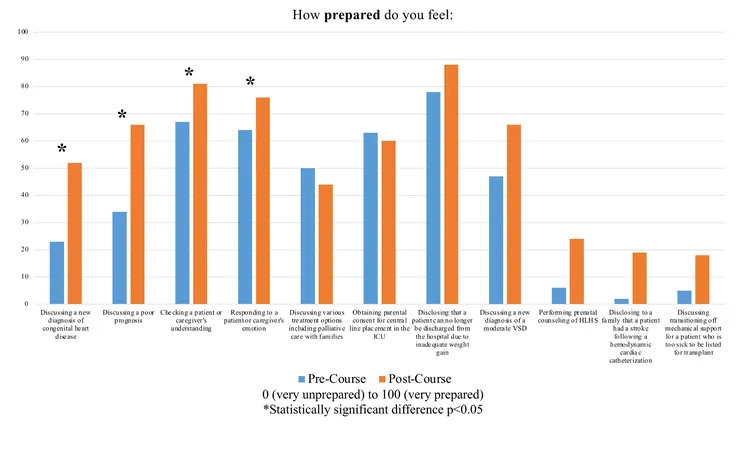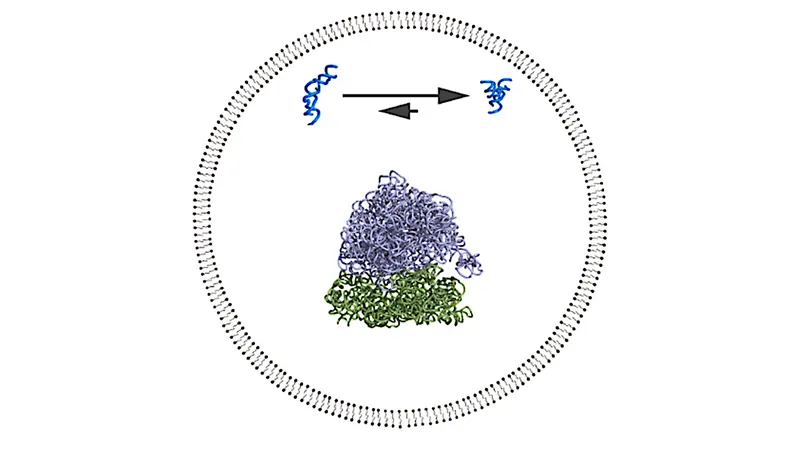
Revolutionizing Communication Skills in Pediatric Cardiology: A Groundbreaking Training Initiative
2024-10-07
Author: Wei Ling
Introduction
In the world of pediatric cardiology, the stakes are incredibly high when it comes to delivering difficult news to families. Recent studies have underscored the crucial link between effective clinician-patient communication and positive health outcomes. This new pilot study sheds light on a transformative training initiative aimed at equipping pediatric cardiology fellows with essential communication skills, specifically designed to navigate the often daunting task of discussing serious medical issues such as congenital heart disease.
Training Overview
The pilot project, conducted at Boston Children’s Hospital, involved a comprehensive 3-hour communication training session for pediatric cardiology fellows. This innovative approach utilized the VitalTalk methodology—a proven framework for training healthcare providers in sensitive communications—with educational expertise from both the Department of Cardiology and the Dana-Farber Cancer Institute.
During the training, fellows engaged in one hour of foundational learning about delivering serious news and addressing family emotions, followed by two hours of immersive role-playing with trained actors. This interaction provided a safe space for fellows to practice and refine their skills, simulating real conversations they would likely face in clinical settings.
Key Findings
With nine fellows participating—eight first-year and one third-year—the study reported a staggering 100% completion rate of pre- and post-training surveys, as well as an 8-month follow-up survey. Results indicated a significant surge in fellows’ confidence and preparedness when addressing difficult topics.
1. **Increased Preparedness**: The fellows reported a remarkable improvement in their ability to communicate a new diagnosis of congenital heart disease and effectively discuss poor prognoses.
2. **Enhanced Comfort Levels**: Participants felt increasingly comfortable responding to emotional cues from families, a critical skill in fostering therapeutic relationships.
3. **Real-World Application**: Approximately 44% of fellows actively utilized the training skills in clinical environments months after their training, highlighting the course's lasting impact.
Communication Challenges Identified
Despite the gains, fellows cited specific challenges that complicated serious conversations, such as:
- **Finding the Right Words**: A staggering 67% mentioned this as a hurdle.
- **Balancing Honesty with Hope**: At 78%, this struggle reflects the delicate nature of pediatric cardiology discussions.
- **Clinical Uncertainty**: Also affecting 78%, this factor often leads to parental anxiety and confusion.
Future Directions
The study emphasizes the need for more extensive research to evaluate the long-term application of these skills and their effectiveness across larger cohorts. Ideas for future training sessions may include:
1. **Specialized Topics**: Focusing on particularly challenging conversations, such as those surrounding end-of-life care.
2. **Multi-Disciplinary Approach**: Offering refresher courses or involving all members of the care team to promote a unified communication strategy.
Conclusion
This pilot study showcases the vital importance of structured communication training in pediatric cardiology. As healthcare practices continue to evolve, preparing future pediatric cardiologists to handle emotionally challenging discussions with poise and empathy is not just beneficial—it's imperative for enhancing patient care and satisfaction. The insights gathered from this initiative serve as a stepping stone for future training endeavors, ensuring that pediatric cardiology trainees are not only skilled clinicians but also compassionate communicators ready to tackle the toughest conversations in medicine.





 Brasil (PT)
Brasil (PT)
 Canada (EN)
Canada (EN)
 Chile (ES)
Chile (ES)
 España (ES)
España (ES)
 France (FR)
France (FR)
 Hong Kong (EN)
Hong Kong (EN)
 Italia (IT)
Italia (IT)
 日本 (JA)
日本 (JA)
 Magyarország (HU)
Magyarország (HU)
 Norge (NO)
Norge (NO)
 Polska (PL)
Polska (PL)
 Schweiz (DE)
Schweiz (DE)
 Singapore (EN)
Singapore (EN)
 Sverige (SV)
Sverige (SV)
 Suomi (FI)
Suomi (FI)
 Türkiye (TR)
Türkiye (TR)